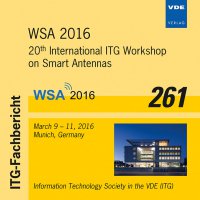Anticipatory Networking for Energy Savings in 5G Systems
Konferenz: WSA 2016 - 20th International ITG Workshop on Smart Antennas
09.03.2016 - 11.03.2016 in München, Deutschland
Tagungsband: WSA 2016
Seiten: 7Sprache: EnglischTyp: PDF
Persönliche VDE-Mitglieder erhalten auf diesen Artikel 10% Rabatt
Autoren:
Pollakis, E. (Fraunhofer Heinrich Hertz Institute, Einsteinufer 37, 10587 Berlin, Germany)
Stanczak, S. (Fraunhofer Heinrich Hertz Institute, Einsteinufer 37, 10587 Berlin, Germany & Technische Universität Berlin, Einsteinufer 27, 10587 Berlin, Germany)
Inhalt:
In this paper, we devise novel techniques for saving energy in 5G wireless systems. By means of anticipated transmission rates we find user-cell assignments and scheduling policies that help to identify energy-efficient network topologies. In particular, the objective of this paper is to find a usercell association and rate allocation over time that provides the requested Quality of Service (QoS) to all users while attempting to reduce the energy consumption by identifying the set of active cells consuming the least amount of energy. The used energy consumption model specifically includes the static energy consumption and the dynamic, loaddependent energy consumption of cells. We formalize this problem as a non-convex optimization problem that accounts for the requirements of buffered delay-sensitive applications. We apply relaxation techniques to find feasible anticipated schedules for rate allocation and user-cell assignments with a low complexity algorithm which is amenable to online implementation. We characterize achievable energy savings by means of simulations in a realistic network scenario under realistic traffic patterns.


